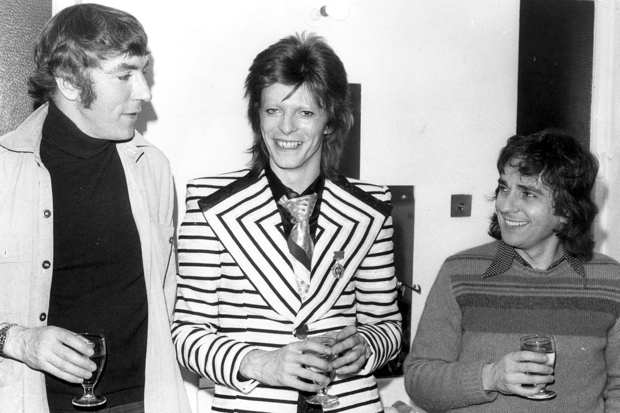It’s no joke, writing about comedians. Their work is funny, their lives are not. Rightly honouring the former while accurately relaying the disasters of the latter is a challenge few writers can well meet.
Peter Cook and Dudley Moore have been extensively studied before. Harry Thompson published his excellent biography of Cook in 1997, Barbara Paskin her authorised biography of Moore the same year; Alexander Games’s joint biography Pete & Dud followed in 1999. There have been memoirs of Peter Cook by his first and second wives, Wendy and Judy, and his third wife, Lin, has edited Something Like Fire: Peter Cook Remembered.
What’s to add? William Cook (no relation) has previously compiled two essential script anthologies, Tragically I Was An Only Twin: The Complete Peter Cook, and Goodbye Again: The Definitive Peter Cook and Dudley Moore. Now he has written not just another joint biography but a book explicitly centred on their relationship, based on the idea that ‘Cook and Moore each created some wonderful comedy individually, but the stuff that will endure is the stuff they did together’ — just like Lennon and McCartney. ‘One Leg Too Few is a sort of love story, the story of a doomed romance,’ he says, pushing it from the start.
William Cook knows this familiar story all too well (although he never met either of his subjects): Dudley, born with a club foot, growing up in Dagenham, short, cheeky, his musical talent taking him to an organ scholarship at Oxford, joining Beyond the Fringe in Edinburgh in 1960, playing the straight man to Cook until Cook’s alcoholism broke up the partnership, while Moore found surprising stardom in Hollywood with 10 and Arthur; Peter, tall, handsome, educated at Radley, famous while still an undergraduate at Cambridge, incomparably funny in his twenties and later too, but, always prone to boredom and loneliness, becoming addicted to both drink and drugs, to the gross impairment of his genius, dying from liver failure in 1995, aged 57.
But as well as lacking in new information, the narrative of One Leg Too Few is over-determined and sententious, always looking forward to the end and back from it. Running through Cook’s and Moore’s early careers, as the author can’t resist telling us, one incident after another was ‘curiously prophetic’, ‘a sign of things to come’. Of the first meeting of Cook, Moore, Alan Bennett and Jonathan Miller over lunch in an Italian restaurant, we are told: ‘Despite their various reservations, this meal encapsulated all the elements which made Beyond the Fringe so special.’ How could it not — in retrospect?
On page 31, the author describes what an impression, ‘in hospital one Christmas, when he was seven’, a kind nurse’s goodnight kiss made on Dudley:
This kiss was Dudley’s Rosebud, his emotional raison d’etre, and none of the many liaisons of his adult life ever entirely matched it, even though, in a quest to recreate it, he would seduce some of the most glamorous women in the world.
Gosh! But then on p. 314, William Cook says the very same of a Tiffany lamp that Peter had given Judy, his second wife: ‘This lamp was Peter’s Rosebud.’
The running forward to hindsight is often tasteless. In 1989, Mavis Nicholson asked Pete and Dud where they thought they’d be in 15 years’ time.
‘Hampstead Tube station, I think’, said Dudley. ‘I shall be lying in a haze of morphine in a luxurious Swiss hospital’, said Peter. In fact, they were both dead,
says our living dog of these extinguished lions.
To hold the dual narrative together, William Cook repeatedly makes Dudley’s womanising and Peter’s drinking equivalent, as problems holding them back from happy collaboration. By the early Seventies, Peter was drunk every night but Dudley was a prisoner of sex, we are told. ‘It was an addiction just as powerful as Peter’s addiction to alcohol’, Cook claims. Still needing to make his main case, he adds, though, that even at this stage, ‘When Peter was sober and Dudley wasn’t trying to get off with Judy, the impact of their double act was still greater than its increasingly disparate parts.’
The book tails off into an appendix of interviews (‘But Also’) with people who knew Cook and Moore, some of them, notably reformed alcoholics Chris Langham and Barry Humphries, speaking realistically about alcoholism, offering sharper insights than William Cook himself. Peter Cook’s Cambridge contemporary Michael Burrell speaks the truth too: ‘Dudley wasn’t an originator in the way that Peter was. Peter was a creator — and he created a world.’
After Peter Cook’s death, Jonathan Ross said the best thing:
It’s such a shame that Peter didn’t get around to writing his own tributes. If he had, then we wouldn’t have had to suffer halfwits and dunderheads prattling on about how he never fulfilled his youthful potential. Of course he fulfilled it, he fulfilled it when he was still young.
And, intermittently, afterwards too. If by any mischance you do not already know it, a much better purchase than this book, a Christmas present universally applicable, is the BBC CD of Why Bother? Sir Arthur Streeb-Greebling in Conversation with Chris Morris, five ten-minute interviews originally broadcast on Radio 3 in 1994, Peter Cook being wonderfully funny and inventive without any assistance from Dudley Moore, just a year before he died. There may be no better guide to life — certainly to proceedings on the Today programme.






Comments